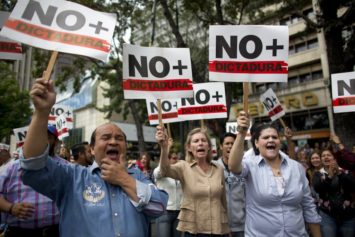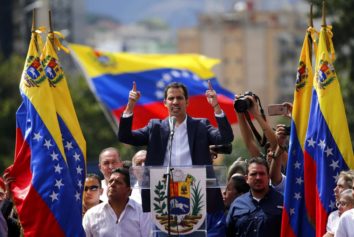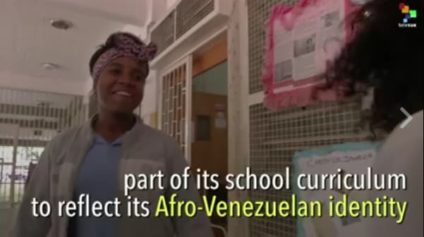As surgeons in Cuba began the “pre-operation protocol” to remove the cancer from Venezuelan President Hugo Chavez, there were tears in Caracas as Vice President Nicolas Maduro broke down during a rally for Chavez.
“Chávez has a nation, he has all of us, and he’ll have all of us forever in this battle,” Maduro said, wiping away tears while speaking to supporters. “Even beyond this life, we’re going to be loyal to Hugo Chávez.”
Ecuadorian President Correa visited his close friend Chavez in Havana prior to his operation and told reporters today the surgery was “a very delicate operation.”
“My friend, Commander Hugo Chavez, is going through the toughest times of his life,” Correa said. “He changed the history of Venezuela and of a large part of Latin America.”
“He’s in good spirits,” Correa said. “You know what Hugo’s like, always ready for tough battles with optimism and faith … I’m not going to lie, we’re very worried. It’s a serious matter.”
Two time Academy Award-winning actor and well-known humanitarian Sean Penn, one of Chavez’s most prominent international supporters, who spends considerable time in Haiti helping the nation recover from the 2010 earthquake, joined a vigil for Chavez in Bolivia. “He’s one of the most impressive forces on the planet and we need to show him our love,” Penn was quoted as saying by local media.
Before he left Venezuela, Chavez gave a speech in which he said he may not be able to serve his fourth term because he must undergo his fourth surgery and treatment. He practically pleaded with the populace to choose his vice president and confidant Maduro, 52, the former bus driver, as his successor.
If “some circumstance” should prevent him from completing his term or starting his next one, Chavez said, Maduro should not only complete the current term but also be elected president to replace him, “in my firm, irrevocable, absolute and total opinion.… This I ask you from the heart.”
Maduro (in photo above) has been a close friend and confidante of Chavez’s for 20 years—he was among the tiny circle who originally accompanied Chavez to Cuba for his cancer operation. Genial and well-liked, Maduro is considered a more moderate force in the Socialist regime than many other hard-liners.
The Venezuelan constitution dictates that if Chavez resigns or dies, his vice president would have to be elected in a new election called by Congress. Maduro would likely face a strong challenge from Diosdado Cabello, president of the National Assembly and a former army comrade of Chavez’s, and also opposition candidate Henrique Capriles, who was beaten soundly by Chavez in October and who is running for governor of Miranda state in Sunday’s state and local elections.
“The President promised villas and castles during the election, he got more votes than what we got on October 7, so the government must keep its promise to the Venezuelan people,” he said during the interview with Exitos radio station. “What will happen only the President and God knows.”
“There is no chavismo without Chávez,” Capriles said, referring to the movement begun in Venezuela by Chavez. He said the country’s problems have been offset by the President’s charisma and his followers’ loyalty.
“But if you take away the face of the President (from the ruling party), what do you have?” he asked.
Before leaving for Havana, Chávez met with military commanders at the presidential palace and promoted his defense minister, Diego Molero, to the rank of admiral in chief. Always ready to create a dramatic moment, Chávez showed Molero and other military commanders a golden sword that once belonged to independence hero Simon Bolivar.
With the sword in hand, Chávez reportedly told the officers that he fully trusts them and that they should be aware of enemies, both at home and abroad.
“I’m totally sure that our homeland is safe,” Chávez told them. He urged them “not to give in to intrigue.”


